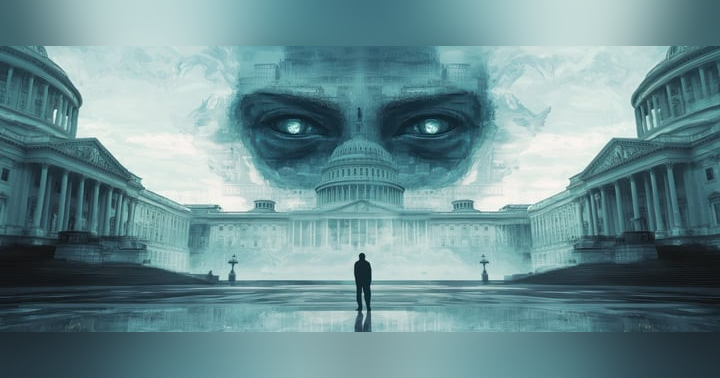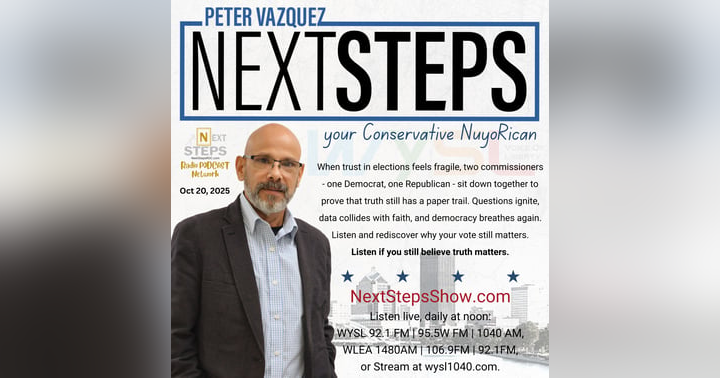
Truth at the Crossroads: A nameless soldier stands at the foot of the Cross.
He has orders. He has a spear. In front of him hangs the One who called Himself the Truth.
Scripture tells the story in a single verse: “One of the soldiers pierced His side with a spear, and immediately blood and water came out” (John 19:34). Tradition later tried to give that soldier a name – Longinus – but the Bible leaves him anonymous. It does not tell us whether he repented, whether he believed, or whether he walked away hardened forever.
All we really know is this: he stood inches from the Truth made flesh, close enough to touch Him, close enough to be washed by His blood… and he still thrust the spear.
That is more than a detail in a crucifixion scene. It is a mirror.

For years, we were told America was becoming “post-Christian.” Many dismissed that as panic, others as progress. Now the numbers are catching up with the feeling in our gut.
Recent surveys suggest around 62–69 percent of Americans still identify as Christian, depending on the poll. That sounds solid until you look at the trend line: in 2007, it was about 78 percent. The religiously unaffiliated – the “nones” – have climbed to roughly 29 percent, the highest on record.
Worse, fewer than half of U.S. adults now say religion is important in their daily lives, down 17 points in a decade. About 15,000 churches are expected to close this year, far more than will open, with mainline Protestant and Catholic congregations shrinking the fastest.
The surface still looks “Christian.” The label has not disappeared. But the cliff beneath it has already given way.
Many churches leaned into politics, branding, and institutional survival instead of repentance, discipleship, and courage. Others clung to empty ritual while scandals, abuse, and compromise hollowed out their moral authority.
The results are predictable: religious institutions that once formed conscience now chase relevance, and people who once stood on Scripture now stand on sentiment.
We kept the name. We lost the power.
That is a Longinus moment. Close enough to truth to quote it. Too hardened to be changed by it.
Walk through any airport, bus, or high school hallway. Heads down. Screens glowing. Earbuds in. A generation more “connected” than any in history, and somehow more alone than any in recent memory.
The U.S. Surgeon General officially declared loneliness and isolation a public health epidemic in 2023. Federal data show about one in two adults reporting measurable loneliness in recent years.
A 2024 poll found 30 percent of adults feel lonely at least once a week, and 10 percent say they are lonely every day.
Loneliness is not just an emotion. It carries health risks comparable to smoking up to 15 cigarettes a day, increasing the risk of heart disease, stroke, dementia, depression, anxiety, and premature death.
Technology promised us connection. What we got instead was hyper-stimulation without community, communication without covenant, “friends” without fellowship. Children scroll in bedrooms instead of riding bikes in neighborhoods. Young adults date profiles instead of people. Parents collapse in front of streaming shows because real conversation requires energy no one has left.
We built devices that could beam information anywhere on earth in seconds, yet we neglected the older technology of eye contact, family dinners, and church picnics.
We chose efficiency over presence, productivity over relationship. The Surgeon General issued an advisory. Scripture issued a warning centuries ago: “It is not good that man should be alone.”
Once again, truth stands right in front of us – in our statistics, in our emergency rooms, in our quiet tears at night – and yet we drive the spear in deeper. We hand six-inch screens to six-year-olds and then act surprised when their souls’ fracture.
While we debate abstractions, families sleep in motels.
On a single night in January 2024, more than 771,000 people were homeless in the United States – the highest number since the federal government began using modern tracking methods. That represented an 18 percent jump in just one year, after a 12 percent increase the year before.
Nearly 327,000 people experiencing homelessness lived in emergency or transitional shelters, a higher share than in the early 2010s. In New York, homelessness spiked a staggering 53 percent in 2024, driven heavily by migrant families crowding city shelters.
Behind every percentage point is a child trying to sleep under fluorescent lights, a mother arguing with a hotel clerk about checkout time, a father crushed by a mix of bad choices and bad policies.
We do not suffer from a shortage of spending. We suffer from a shortage of wisdom.
Billions flow into temporary band-aids: hotel rooms, short-term contracts, bureaucratic pilot programs. Those are sometimes necessary in crisis, but too often they become permanent business models. “Emergency” money is easier to approve than the slow, boring work of reforming zoning laws, confronting addiction, rebuilding trades training, and strengthening marriage.
The result is predictable: a river of cash that sustains the crisis instead of solving it.
We have turned compassion into a line item and delegated responsibility to systems that will never love anyone. Government can and sometimes must be part of the solution. However, it cannot heal hearts, reconcile families, or train character. When we pretend it can, we are not being compassionate; we are being cowardly.
We see the truth in HUD reports, shelter statistics, and local budgets. Then, like the soldier with the spear, we look straight at it and walk away.
Compassion without stewardship turns into theft.
Recently, the U.S. Department of Agriculture flagged at least 186,000 Supplemental Nutrition Assistance Program (SNAP) accounts linked to deceased individuals across 29 states. That discovery is now forcing a nationwide recertification effort for more than 40 million recipients.
At the same time, a federal inspector general report revealed that multiple states made improper Medicaid payments to managed care organizations after enrollees had died, exposing persistent failures in basic oversight.
What does this tell us? Not that every person on assistance is a cheat. Most are not. It tells us that systems built in the name of compassion have grown so large, so automated, and so politically untouchable that basic accountability goes missing.
It is easy to sign your name to a “relief” bill and tell yourself you solved poverty. It is harder to ask whether you just built a machine that pays benefits to the dead while trapping the living in cycles of dependence, paperwork, and despair.
A biblical worldview does not oppose helping the poor. It commands it. But Scripture ties generosity to responsibility, charity to truth, and aid to repentance and transformation.
When we sever those links, we do not get mercy. We get managed misery.
Once again, the numbers are preaching. We just refuse to listen.
In the ancient world, Israel melted gold into a statue and bowed to it. In the modern world, we put chips in plastic, wrap them in sleek interfaces, and call them “solutions.”
Digital identity systems are spreading rapidly across the globe. Analysts projected that by 2024, governments would have issued around 5 billion digital IDs worldwide.
India’s Aadhaar program alone covers roughly 1.3 billion people, tying biometric data – fingerprints, iris scans, facial images – to everyday life, from bank accounts to government benefits. Countries from Singapore to Sweden are rolling out their own versions.
Digital ID can fight fraud, speed up services, and simplify life. It can also concentrate power, collapse privacy, and make access to food, work, and travel contingent on “approval” from systems that citizens neither designed nor control.
Revelation 13 describes a future in which no one can buy or sell without a mark or authorization.
Christians have debated the details for centuries, and this is not the place to declare an exact fulfillment. What matters in our moment is the posture of the heart.
Are we so enamored with efficiency, security, and convenience that we no longer ask, “Should we?” Are we training ourselves, and our children, to accept that the right to participate in economic life is something to be granted by a system rather than endowed by a Creator?
Digital ID is not automatically evil. However, a culture that no longer believes in objective truth, in fixed rights, or in God will eventually use any powerful tool against dissenters. Technology does not change the human heart; it amplifies it.
When we stare at these systems, shrug, and say, “That is just progress,” we are doing what the soldier did: standing in front of something with eternal implications and treating it like a routine task.
In the transcript that sparked this reflection, a retired police officer called in and said something simple and profound: “We do not bear the sword in vain.” That is Romans 13 in plain clothes. God ordains legitimate authority. At the same time, He will judge those who use it unjustly.
Every uniformed officer, every soldier, every bureaucrat with a keyboard, and every corporate executive with a terms-of-service panel faces a version of the same question the Roman soldier faced: Will I simply “do my job,” or will I ask whether my duty aligns with truth?
There is a frightening comfort that comes with hiding behind procedure. The soldier could tell himself, “I am following orders.” The censor could say, “I am enforcing policy.” The social worker can say, “I am just applying the rules.” The AI engineer can say, “I am just building what the client requested.”
At some point, all of us have a spear in our hand, and Truth standing in front of us.
This is not a hopeless story. It is a sober one.
Despite declines, the majority of Americans still identify as Christian.
Thousands of small churches remain faithful in obscurity, preaching repentance and redemption while the cameras chase scandals elsewhere. Homelessness is rising, but so are examples of local ministries, private donors, and community groups quietly moving families into real homes instead of temporary rooms.
Loneliness is epidemic, but every kitchen table can become a counter-revolution against isolation. Every open Bible on a coffee table is an act of resistance against the idea that truth is whatever we feel.
Every father who comes home, turns his phone off, and looks his children in the eye is punching a hole in the darkness.

The Roman soldier at the Cross is left unnamed so that no one can say, “That was him, not me.” The risk in America today is not that we have too much information. It is that we have too little repentance.
We think data is the same as wisdom. It is not.
We have statistics that show churches closing and faith slipping from daily life. We have charts mapping loneliness, overdose deaths, suicide, homelessness, and family breakdown. We have inspector general reports documenting fraud and waste. We have white papers on digital identity, essays on polarization, and think-tank reports on fertility and marriage.
We are drowning in evidence and starving for courage.
The Longinus moment is not a scene in someone else’s story. It is the crossroad in front of us. We can keep thrusting the spear into anything that threatens our comfort, numbing ourselves with more entertainment, more outrage, more dependency, more efficiency.
Or we can finally allow the blood and water – the reality of Christ’s sacrifice, the hard truth about our condition, the hope of real rebirth – to open our eyes.
That choice will not be made by institutions first. It will be made in living rooms, in pews, in squad cars, in classrooms, and in those quiet places where a man or woman whispers, “Lord, I have been blind. Help me see.”
This is the work:
- Return to truth. Rebuild family. Restore responsibility. Relearn courage.
- Stop thrusting the spear. Start recognizing the darkness for what it is.
- And then, with God, family, and honest work at the center, start leading.




